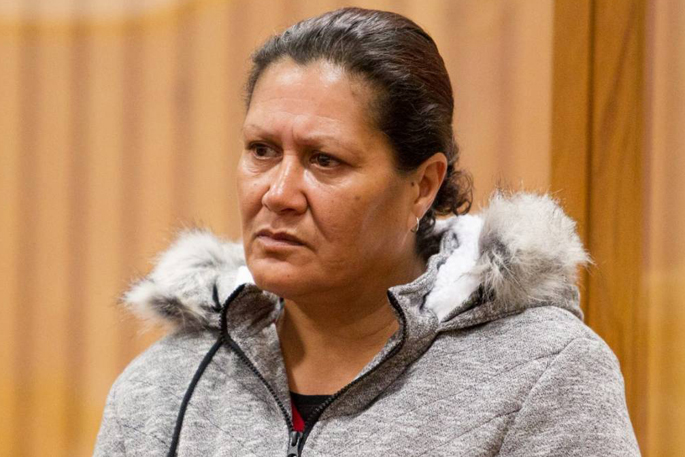A jury has found the grandmother of a baby boy who died after being left in a hot car for hours - while she smoked synthetic cannabis and passed out - guilty of his manslaughter.
Donna Catherine Parangi, 54, has been standing trial in the High Court in Hamilton for the last 15 days.
Her grandson, eight-month-old Isaiah Neil, died from heatstroke - also known as hyperthermia - after being left in a dark blue station wagon for two to three hours outside her home in Rūātoki, in the Eastern Bay of Plenty, on November 2, 2015.
The jury retired to consider their verdicts at 11.45am on Monday, following the summing up of Justice Sally Fitzgerald.
They returned with their unanimous verdict at 4.45pm.
"Thank you. So much," a scowling Parangi muttered as she was ushered from the courtroom after the jury gave its decision.
After the judge formally discharged the jury of their duties, a now tearful Parangi was brought back to the court so the judge could convict and issue her with a first strike warning for serious offenders.
She was remanded on bail to a nominal sentencing date of May 10, in Hamilton.
The Crown case in the trial - which was a retrial, after her previous conviction for manslaughter was overturned on appeal - was led by Richard Marchant and Hayley Sheridan, who successfully argued Parangi was partly responsible for his death.
Parangi was represented by Susan Gray and Julie-Anne Kincade, who disputed Isaiah's cause of death.
Two of the key witnesses for the Crown were Isaiah's parents Shane Neil and Lacey Te Whetu, who is Parangi's daughter.
The pair, who were living with Parangi at the time, had pleaded guilty to their son's manslaughter.
Te Whetu was sentenced to three years in jail, while Neil was sentenced to 10 months.
Parangi and Te Whetu were addicted to synthetic cannabis and all three had allegedly been smoking it that day and were in a state of extreme drowsiness as a result.
Earlier in the day, during her summing up, Justice Fitzgerald said the trial would have been an uncomfortable experience for the jurors.
"No doubt parts of the trial were very emotional ... a tragedy for all involved. Nobody wanted this to happen."
She told the jurors that just because Neil and Te Whetu pleaded guilty to manslaughter, they should not infer Parangi was also guilty of the charge.
"That would be quite improper and quite unfair."
Parangi should be tried solely on the evidence presented in court. Likewise they should not read anything into Parangi's decision not to give evidence herself.
"That she did not give evidence does not add to the case against her."
She issued the jurors with a question trail to help them with their deliberations.
That document posed a series of queries, starting with whether they believed Parangi was acting in the role of a parent at the time Isaiah died, and whether she had "actual care" of him when he was left in the car, following a trip to Kawerau and back that morning.
The next question was the one the bulk of evidence heard in the trial was focused on: Are you sure Isaiah died of hyperthermia after being left in the car?
This would mean they would have to conclude that he did not die of something else, such as - as the defence has suggested as a possibility - unintentional overlay, also known as accidental suffocation, while he was in his parents' bed.
The jurors had a wealth of expert evidence to refer to in their deliberations on this point, including pathologists, a paediatrician, and a heat expert who had estimated the temperature in the car, at the time Isaiah was allegedly inside it, would have been around 45 degrees.
If they were not sure, they would have to find Parangi not guilty. If they concluded hyperthermia was the cause of death, there were a few follow-up questions they needed to ponder.
These were whether she took reasonable steps to protect Isaiah from harm or injury; and whether this played a significant part in - and thus caused - his death.
Finally, they were asked: Was the omission a major departure from the standard of care to be expected of a reasonable person in those circumstances?



0 comments
Leave a Comment
You must be logged in to make a comment.